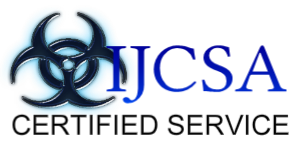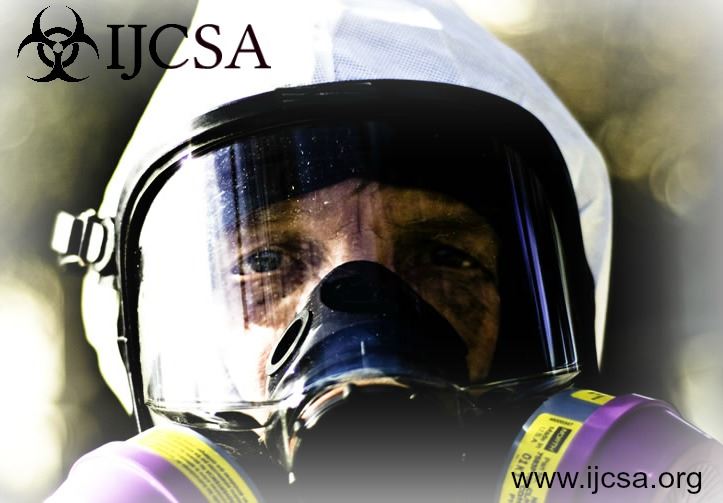![]() Storm Damage Update 2/14/26
Storm Damage Update 2/14/26 ![]() - We are experiencing high call volume. To find a certified water damage restoration service near you please click here.
- We are experiencing high call volume. To find a certified water damage restoration service near you please click here.
IJCSA Biohazard Cleaning Certification (BCC) |
 The IJCSA Biohazard Cleaning Certification course is for people seeking crime scene death cleanup training so they can start their own company, work for an existing company, or add this service onto an existing cleaning, janitorial, carpet cleaning, or flood damage company. As the the industry leader in affordable online cleaning certification courses since 2004 all of our courses, textbooks, training materials, and exams are online. There are no extra fees for textbook files, downloads or exams. This course is included free with your IJCSA Membership and includes a private forum for students to ask questions and get answers from Instructors and other Certified IJCSA Members performing biohazard cleaning services. The IJCSA Biohazard Cleaning Certification course is for people seeking crime scene death cleanup training so they can start their own company, work for an existing company, or add this service onto an existing cleaning, janitorial, carpet cleaning, or flood damage company. As the the industry leader in affordable online cleaning certification courses since 2004 all of our courses, textbooks, training materials, and exams are online. There are no extra fees for textbook files, downloads or exams. This course is included free with your IJCSA Membership and includes a private forum for students to ask questions and get answers from Instructors and other Certified IJCSA Members performing biohazard cleaning services.
If you landed on this page by accident and require a certified biohazard cleaning service - Please click here. This is an advanced level IJCSA Member Certification Course. Must have completed and passed the following IJCSA Certification Courses prior to taking the IJCSA Biohazard Cleaning Certification Course. All of the following cleaning certifications below are REQUIRED for complete safety and understanding to properly clean a biohazard cleaning situation successfully.

The IJCSA Biohazard Cleaning Course is a interactive live course that will take you through every business aspect of decontaminating a hazardous crime scene & decomposition scene. Sign Up For This Certification Course Here >> ONLINE COURSE DESCRIPTION: Introduction - Introduction for layout of course material and testing 1910.120(a)(1) Scope. This section covers the following operations, unless the employer can demonstrate that the operation does not involve employee exposure or the reasonable possibility for employee exposure to safety or health hazards: 1910.120(a)(1)(i) Clean-up operations required by a governmental body, whether Federal, state local or other involving hazardous substances that are conducted at uncontrolled hazardous waste sites (including, but not limited to, the EPA's National Priority Site List (NPL), state priority site lists, sites recommended for the EPA NPL, and initial investigations of government identified sites which are conducted before the presence or absence of hazardous substances has been ascertained); 1910.120(a)(1)(ii) Corrective actions involving clean-up operations at sites covered by the Resource Conservation and Recovery Act of 1976 (RCRA) as amended (42 U.S.C. 6901 et seq); 1910.120(a)(1)(iii) Voluntary clean-up operations at sites recognized by Federal, state, local or other governmental bodies as uncontrolled hazardous waste sites; 1910.120(a)(1)(iv) Operations involving hazardous waste that are conducted at treatment, storage, disposal (TSD) facilities regulated by 40 CFR Parts 264 and 265 pursuant to RCRA; or by agencies under agreement with U.S.E.P.A. to implement RCRA regulations; and 1910.120(a)(1)(v) Emergency response operations for releases of, or substantial threats of releases of, hazardous substances without regard to the location of the hazard. 1910.120(a)(2)(i) All requirements of Part 1910 and Part 1926 of Title 29 of the Code of Federal Regulations apply pursuant to their terms to hazardous waste and emergency response operations whether covered by this section or not. If there is a conflict or overlap, the provision more protective of employee safety and health shall apply without regard to 29 CFR 1910.5(c)(1). 1910.120(a)(2)(ii) Hazardous substance clean-up operations within the scope of paragraphs (a)(1)(i) through (a)(1)(iii) of this section must comply with all paragraphs of this section except paragraphs (p) and (q). 1910.120(a)(2)(iii) Operations within the scope of paragraph (a)(1)(iv) of this section must comply only with the requirements of paragraph (p) of this section. 1910.120(a)(2)(iii)(A) All provisions of paragraph (p) of this section cover any treatment, storage or disposal (TSD) operation regulated by 40 CFR parts 264 and 265 or by state law authorized under RCRA, and required to have a permit or interim status from EPA pursuant to 40 CFR 270.1 or from a state agency pursuant to RCRA. 1910.120(a)(2)(iii)(B) Employers who are not required to have a permit or interim status because they are conditionally exempt small quantity generators under 40 CFR 261.5 or are generators who qualify under 40 CFR 262.34 for exemptions from regulation under 40 CFR parts 264, 265 and 270 ("excepted employers") are not covered by paragraphs (p)(1) through (p)(7) of this section. Excepted employers who are required by the EPA or state agency to have their employees engage in emergency response or who direct their employees to engage in emergency response are covered by paragraph (p)(8) of this section, and cannot be exempted by (p)(8)(i) of this section. 1910.120(a)(2)(iii)(C) If an area is used primarily for treatment, storage or disposal, any emergency response operations in that area shall comply with paragraph (p) (8) of this section. In other areas not used primarily for treatment, storage, or disposal, any emergency response operations shall comply with paragraph (q) of this section. Compliance with the requirements of paragraph (q) of this section shall be deemed to be in compliance with the requirements of paragraph (p)(8) of this section. 1910.120(a)(2)(iv) Emergency response operations for releases of, or substantial threats of releases of, hazardous substances which are not covered by paragraphs (a)(1)(i) through (a)(1)(iv) of this section must only comply with the requirements of paragraph (q) of this section.
Also Included: General Business Details - How to start a Biohazard Cleaning Business or add on Biohazard Cleaning to your existing service. How to market your services. How to bill and collect from clients. 100% Real Life Biohazard Cleaning Situations: Learn from the pros! Real life biohazard cleaning situations and photos our members encountered or that you might have seen in the news. Interactive Live Forum - Ask questions and get answers from instructors and other members performing Biohazard Cleaning Services. All Residential & Biohazard Cleaning Situations Covered: Crime Scene Clean-Up, Decomposition & Odor, Trauma Cleaning, Unattended Death Cleaning, Pet Hoarding Situations, Biohazard Hoarding Situations, Sewage Back Ups & Floods, Teargas Clean Up. Support Group Included - A special support group only for IJCSA Members to discuss Biohazard Cleaning Situations and get immediate advice while on the job site. Course Details: Time: Course can be completed in under 40 hours. Certify yourself or employees. |
